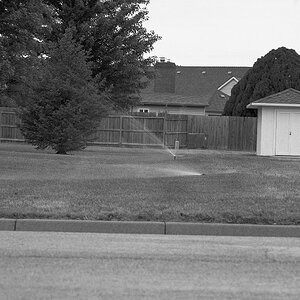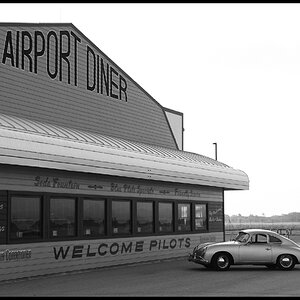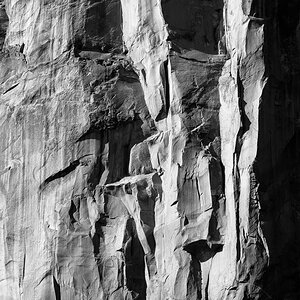- Joined
- Sep 2, 2003
- Messages
- 34,503
- Reaction score
- 7,531
- Location
- In the mental ward of this forum
- Can others edit my Photos
- Photos NOT OK to edit
This is slowly descending into a film v. digital debate, which is why I grimaced when I saw the title.
You guys just can't seem to help yourselves.
The question the OP posed is "Will film ever come back?" Ambiguous enough, since it never left the market, and new films continue to come onto the market.
So what is the real point of the question? Will it "come back" in a way where mass-produced cheap film P&S cams reign supreme over mass-produced cheap digital P&S cams? Will film as a medium win back the hearts and minds of the masses? The answer to both questions is unquestionably a resounding "No", particularly the second one. How to lure in the crowd who has grown up on digital and cut their teeth on the idea that photography is only another McGadget (makes a *job* go faster, easier & with a cool new high-tech slant)?
But no one seems to be satisfied with this conclusion; you all want to continue to hammer away the merits of each, the costs of each, or even the environmental soundness of each. Both have pros and cons; each will clearly win over the other in certain categoies, and it's all been argued, ad nauseam - and really, who gives a crap? :razz:
If you want to shoot film, you're going to shoot film. Go for it! If you want to shoot digital, you're going to shoot digital. Go for it! There is no wrong choice, for it is a subjective one based upon your own needs, your wallet, your preferred method of giving your artistic voice an outlet, earning some extra money - or just showing pics of the family vacation or new baby to old Aunt Sally across the country.
And you don't have to defend your choice in a photography forum that supports both.
Now really. Everyone should run out and start using glass plates exclusively again (astonishing, isn't it, that the supplies are still so readily available for so obsolete a process) so these film v.digi debates can DIE! Forever! :hail:
so these film v.digi debates can DIE! Forever! :hail:
You guys just can't seem to help yourselves.
The question the OP posed is "Will film ever come back?" Ambiguous enough, since it never left the market, and new films continue to come onto the market.
So what is the real point of the question? Will it "come back" in a way where mass-produced cheap film P&S cams reign supreme over mass-produced cheap digital P&S cams? Will film as a medium win back the hearts and minds of the masses? The answer to both questions is unquestionably a resounding "No", particularly the second one. How to lure in the crowd who has grown up on digital and cut their teeth on the idea that photography is only another McGadget (makes a *job* go faster, easier & with a cool new high-tech slant)?
But no one seems to be satisfied with this conclusion; you all want to continue to hammer away the merits of each, the costs of each, or even the environmental soundness of each. Both have pros and cons; each will clearly win over the other in certain categoies, and it's all been argued, ad nauseam - and really, who gives a crap? :razz:
If you want to shoot film, you're going to shoot film. Go for it! If you want to shoot digital, you're going to shoot digital. Go for it! There is no wrong choice, for it is a subjective one based upon your own needs, your wallet, your preferred method of giving your artistic voice an outlet, earning some extra money - or just showing pics of the family vacation or new baby to old Aunt Sally across the country.
And you don't have to defend your choice in a photography forum that supports both.
Now really. Everyone should run out and start using glass plates exclusively again (astonishing, isn't it, that the supplies are still so readily available for so obsolete a process)









![[No title]](/data/xfmg/thumbnail/1/1592-cfae4a7ea791f96c6e2d03484be2e454.jpg?1619729144)



